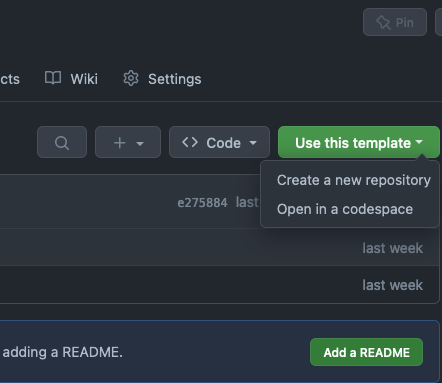Python Template Repo
Python Template Repo aims to help you quickly jumpstart new Python libraries with integrated developer tooling. Try this template out if you intend on distributing your Python library as an open-source Anaconda package and don't want to deal with the repository infrastructure!
Simply follow the "Getting Started" guides below. It is also easily configurable based on your library's needs.
Features
- Python library boilerplate code using standard practices
- Unit testing framework using
pytest - Quality assurance tooling (code formatting and linting)
- Sphinx documentation with Read the Docs Sphinx Theme
- GitHub Actions to run CI/CD workflows for unit testing and quality assurance
- GitHub Issue and Pull Request templates for organized ticket tracking
- Anaconda environments defined in
.ymlfiles for determinism - Licensed with Apache-2.0 and
.gitignoretailored to Python projects
Getting Started
1. Set up the Python Library
Follow the steps below to get this repository tailored to your library.
On this page, click "Use this template" and "Create a new repository"

Clone your new repository
git clone https://github.com/<USERNAME>/<REPO-NAME>Update
setup.pyto replacepython_templatereferences with your project nameRename
/python_template,python_template.py, andtest_python_template.pyto your project name
2. Set up the Anaconda Development Environment
Follow the steps below to get the Anaconda development environment set up for your
library. We recommend using mamba instead of conda because it is significantly
faster and more reliable.
Download and Install Anaconda (Mac OS & Linux)
curl -L -O "https://github.com/conda-forge/miniforge/releases/latest/download/Mambaforge-$(uname)-$(uname -m).sh" bash Mambaforge-$(uname)-$(uname -m).sh
Update
/conda-env/*.ymlby follow each file's#TODOcomments (don't worry, it's straightforward)Create and activate the Conda development environment
mamba env create -f conda-env/dev.yml mamba activate template-dev
3. Set up the Documentation
The library's documentation is setup with Sphinx and Read the Docs Sphinx Theme.
You just need to do a few things to get up and running:
- Update
README.rst,AUTHORS.rst,HISTORY.rst, and/docs/index.rstas needed - Decide how to deploy the documentation. Follow the instructions in the provided links.
- Option 1: Read the Docs
- Option 2: GitHub Pages (via GitHub Actions)
To build the documentation locally (useful for reviewing):
Activate the conda developer environment
mamba activate template-devBuild documentation
- Option 1:
make docsfrom the root of repo (also cleans up and opens docs in your browser) - Option 2:
cd docs && make html
- Option 1:
4. Set up Quality Assurance Tools
This repository includes quality assurance (QA) tools for code formatting (black,
isort), linting (flake8), and unit testing (pytest). These tools ensure
that you can easily catch issues and follow good Python practices without sacrificing
energy on them. These tools are integrated in the pre-commit package as "hooks" that
automatically run when committing changes to files.
To run these QA tools through pre-commit:
Activate the conda development environment
mamba activate template-devInstall
pre-commithooks into the Git repository$ pre-commit install pre-commit installed at .git/hooks/pre-commit
pre-commitwill now run automatically ongit commit!
(optional) Run against all files
- it's usually a good idea to run the hooks against all of the files when adding new hooks (usually pre-commit will only run on the changed files during git hooks)
$ pre-commit run --all-files [INFO] Initializing environment for https://github.com/pre-commit/pre-commit-hooks. [INFO] Initializing environment for https://github.com/psf/black. [INFO] Installing environment for https://github.com/pre-commit/pre-commit-hooks. [INFO] Once installed this environment will be reused. [INFO] This may take a few minutes... [INFO] Installing environment for https://github.com/psf/black. [INFO] Once installed this environment will be reused. [INFO] This may take a few minutes... Check Yaml...............................................................Passed Fix End of Files.........................................................Passed Trim Trailing Whitespace.................................................Failed - hook id: trailing-whitespace - exit code: 1 Files were modified by this hook. Additional output: Fixing sample.py black....................................................................Passed
Useful commands:
- Override
pre-commitchecks:git commit -m <MESSAGE> --no-verify - Run individual hook:
pre-commit run --all-files <black|flake8|isort>
Information on QA tools:
- pre-commit - "Git hook scripts are useful for identifying simple issues before submission to code review."
- black - "The uncompromising code formatter" that "will save time and mental energy for more important matters".
- isort - isort is a Python utility / library to sort imports alphabetically, and automatically separated into sections and by type.
- flake8 - A Python linter that checks Python code for style and syntax errors, and for enforcing a style guide with PEP (Python Enhancement Proposals).
Helpful Knowledge
How GitHub Actions is Used for CI/CD
This repository uses GitHub Actions to run the CI/CD build workflow. This workflow is
automatically triggered with commits on pull requests to main and merging pull requests to main.
Jobs include:
- Run
pre-commitfor formatting, linting, and type checking - Build conda CI/CD environment with different Python versions, build and install
the package, and run unit test suite with
pytest
Here's an example of GitHub Actions in "action": https://github.com/tomvothecoder/python-template-repo/actions
To save time and resources on build cycles, GitHub Actions has been configured to automatically skip jobs instead of re-executing based on the files that are committed. For example, if docs are committed then the unit tests will not run.
Additional Configuration
- Feel free to modify the configuration for QA tools in
pyproject.tomlandsetup.cfg - You can also remove some or all the QA tools if you want (not recommended though).
Just make sure to delete them from your Anaconda
.ymlfiles and remove their entries inpre-commit-config.yamland their configs inpyproject.tomland/orsetup.cfg

